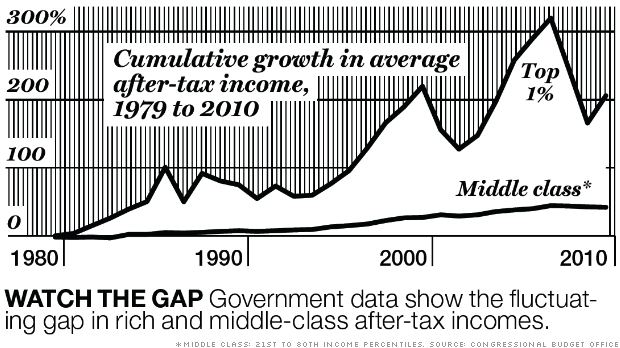The truth about inequality
< < Go Back
by Nina Easton,
President Obama and Pope Francis — meeting at the Vatican in late March — endorse each other’s critique of excess capitalism and rising rates of inequality. But before getting carried away by the joint power behind the inequality theme, let’s put the U.S. problem in its own perspective — with some fresh research.
Look across three decades of increased global competition and human-replacing technology, and there’s no doubt that the American rich fared dramatically better than everyone else. But have middle-class incomes really stagnated? … from 1979 to 2010, the after-tax real incomes of the top 1% of Americans tripled. But middle-class households saw after-tax income gains of 40%.
Conventional political wisdom also holds that social mobility in the U.S. dropped over that same period; in other words, it’s now harder to move ahead than it was in the golden era of the ’50s and ’60s, when incomes were far more equal. But another surprising study — this one from a team led by Harvard economist Raj Chetty — found that nothing had changed. In fact, “measures of social mobility have remained remarkably stable” since the 1950s.
Education levels fuel the income divide, with college degrees paying higher premiums than ever and high school graduates seeing their earnings fall.
Likewise, technological advances are winnowing out middle-class jobs — while the big investment dollars chase tech companies with limited jobs.
A true believer of the inequality crusade might ask, Should a President block Facebook spending $19 billion on WhatsApp with a mere 53 employees?
Income inequality is not a powerful motivator with American voters. Yes, a majority support increasing the minimum wage — which Obama says is the centerpiece of his war on inequality. Yes, people express concern about inequality and tell pollsters they want to raise taxes on the rich. But concern about inequality ranks well behind jobs, the economy, and health care on voters’ lists of concerns. People care more about their own conditions.
Politically, Obama’s focus on income inequality stirs his liberal base, gives Democrats and union leaders a pre-election talking point, and shifts the conversation away from problems plaguing Obamacare. But while this campaign gets plenty of media attention, for the average American it has the same political shelf life as, say, Occupy Wall Street.
More From FORTUNE Magazine:




